- Home
- Colleen Gleason
A Whisper of Rosemary (The Medieval Herb Garden Series) Page 3
A Whisper of Rosemary (The Medieval Herb Garden Series) Read online
Page 3
Papa smiled back, easing her worry that much more. “But it’s not the truth, dearling, that naught has changed—for I have seen changes just in this chamber. You’ve grown more beautiful and more skilled in my absence. I told Raymond I wished to come to the place where I would be cared for the best. And I made the right choice.”
“Aye, indeed, Papa, none will care for you as I do,” Maris told him with a teary smile. “But you must rest now.”
“Aye. That I will. And on the morrow, I have much to say to you, my beloved daughter, and I will brook no disagreement from you.”
~*~
The morning after Christ’s Mass was a cold, clear one, and the sun was high in the sky. Maris shielded her eyes from the brilliance of the snow as she picked her way to the stables.
Her mare, Hickory, nickered softly from the last stall on the left. Maris crooned gently to her, petting the soft black nose that rooted about the folds of her brilliant blue cape for the dried apple hidden therein. She offered the treat to Hickory, then knelt in the stall to look at the injured leg.
Yesterday’s poultice was long dried, and Maris peeled the strips of cloth away. Gingerly feeling the length of the mare’s foreleg, she noted Hickory’s start when she pressed on the muscle that had been strained a week earlier. The swelling from an abrasion against rough stone had eased, but the mare was still in too much pain to walk easily.
Before the warm bruisewort poultice she’d prepared cooled, Maris pressed the cloth that held the herb onto the tender spot on Hickory’s leg. The horse nickered softly and butted her nose against the top of her mistress’s head. Holding the herbal mass firmly in place, she wrapped clean strips of cloth around, binding it firmly to the injured leg.
She was just pulling to her feet when the sound of running footsteps alerted her.
“Lady!”
Maris froze her heart surging into her throat. Papa?
She whirled to see who was dashing into the stables with such haste.
“Milady, you must come at once. Thomas the Cooper’s wife—she’us strainin’ to deliver her babe an’ ’tain’t comin’. I done all I ken,” Widow Maggie pleaded in earnest. She wasn’t nearly as old as the lines on her face made her appear, and today they seemed even deeper and more stark than usual.
“Of course I’ll come.” Relief coursed through her, and Maris, always glad to have something with which to occupy her hands and mind, started out of the stables, brushing past the older woman.
Outside of the keep, a chill wind had kicked up and flurries of snow blew raucously about her cape and Widow Maggie’s three layers of wrap. Maris knew the way to Thomas the Cooper’s home, and trudged along as quickly as she could in the knee-deep snow.
It never occurred to her to bring a man-at-arms with her on a visit to one of her villagers. Maris knew there wasn’t a person within Langumont who would dare or even wish to harm a hair on her head. And if anyone should attempt such a foolish thing, the punishment would be swift and fatal.
Aside of that, it would take much too long to send for one to accompany her in desperate situations such as this.
As she hurried along, Maris wondered not for the first time what Papa intended to speak with her about—but whatever it was would wait until she returned. Papa was just as concerned for the welfare of the residents of Langumont as she was. For without them, the lands wouldn’t be worked, the tradesmen wouldn’t conduct their businesses, and the entire manor would fall to ruin.
All thoughts of her father disappeared when Maris approached the dark, dank hut. She could hear the screams of the woman inside.
Drawing a deep breath—as much to calm her nerves as to dispel the stench of blood, urine and other waste—she ducked her head and, pushing aside the heavy door, entered the hut.
In one corner of the dwelling was a bed, with a prone woman twisting on it in agony. Her huge belly swelled up from under the old blankets. Thomas the Cooper sat next to her on a three legged stool and held her hand. A block of wood was clamped tightly between her teeth, but did nothing to stifle the moans and shrieks of pain.
The windows were shrouded, and smoke from the fire pit choked Maris’s vision. Within moments, she had Thomas and Widow Maggie opening the windows and chimney to let the stagnant air out of the room.
“Darkness only encourages the bad humors,” she explained, stating aloud one of the cardinal rules Good Venny, her mentor, had taught her.
She wasted no time and pushed the blankets up over the woman’s abdomen to see what was happening. Dried blood smeared her legs, but Maris could see the bloody skin of a babe erupting from her womb. It was not the head crowning betwixt the woman’s thighs.
Dear God. “’Tis the bottom that comes. Bring water,” Maris ordered, her lips tight. “And, Maggie, some of that lye soap. I will wash before touching her.”
The leeches and physicians of England did not always agree with the tenets of Good Venny’s homeland, Jerusalem, but Maris had been taught by him and rarely veered from his wisdom. Most of the local leeches would never dare consider what Maris knew she must do to save the woman. She washed her hands quickly—another of Good Venny’s rules—then wiped the legs of the woman so she could better see.
The babe was twisted and bent double as it tried to push from the womb. With no further thought—for if she allowed herself to hesitate, she might not act—Maris reached into the crying woman’s womb and felt the slick bottom of the babe. Fighting against nature, she pushed the infant back in and up. Hardly aware of the gaping stare of Maggie behind her, Maris struggled with the slippery babe, sliding her fingers in and around to turn it into the proper direction.
At last…at last, the baby moved and Maris felt the curve of a small foot. “Push!” she cried to the cooper’s wife. “Push!”
The woman’s muscles bunched and her stomach shifted. Then, with a long, keening moan, the mother forced the babe from her body. Maris guided the infant, feet first, as it erupted from the womb, and at last held the tiny infant in her hands.
The squall of a newborn filled the hut.
“’Tis a son,” Maris announced, handing the babe to Maggie. “Now, mistress, one more push to rid you of the afterbirth and you may rest.” But when she pressed the woman’s stomach and felt another bump and movement within, she realized she was wrong.
“There is another, mistress. You are blessed with two! Push,” Maris ordered, replacing the block of wood between the woman’s teeth. “Comes another babe.”
It took the rest of the woman’s strength to rid herself of her second son, and the afterbirth, mercifully, came shortly after.
“She’ll sleep,” Maris told Thomas. “’Tis likely the babes were tangled in the womb and thus became mixed up.”
She gave him a packet of herbs with instructions to boil them with water and have her drink it as often as she would. “Send for Widow Maggie if you need her. She will bleed some, but not overmuch.” Turning to Maggie, she asked, “Is there not a wet nurse in the village? What of the smith’s daughter?”
“Aye, my lady. I’ll fetch her.” Widow Maggie’s wrinkled face had smoothed a bit, and relief glowed in her eyes.
“Oh, my lady, thank’ee for coming.” Thomas was at her feet, tugging profusely at his forelock. “My lady, thank’ee for my sons.”
“Two strapping boys they’ll be,” Maris said with a smile, and made a mental note to send three chickens and a calf to them from her own stables. “What a good help to you in the shop. But your wife will be poorly for some time. Take care not to work her until Maggie gives the word. Keep the smith’s daughter for a wet nurse as long as you need.”
Then, because the dark room with its stench of blood had finally begun to close in on her, Maris had to get out. She said her last farewells and slipped from the close, smoky hut.
It was dark—Maris looked up in surprise at the moon and stars. She’d spent nearly the whole day in that tiny room. Weariness washed over her, followed by a burst of exhilaration at the re
alization that she had helped two new babes into the world.
Surely God would rather that she spend her time doing such things, rather than embroidering or even praying on her knees in the chapel—which was what many ladies such as her own mother preferred to do.
Maris’s feet crunched in the snow as she trudged along, considering this n. Clutching her pouch in one cold hand, she tucked the other inside her cloak. The moon was bright in the clear sky, lighting her way almost as if it were day.
The gate to the bailey was just ahead, lit invitingly with torches. Surely Papa would be in bed—and if he weren’t, as his healer, she’d have something to say about that. Thus, tomorrow would be soon enough for them to speak on whatever he meant to tell her.
All at once, Maris was jolted from her thoughts as a huge horse appeared from nowhere. He was coming too quickly down the narrow, deserted throughway, and Maris shrieked, holding up a hand to shield her face.
“’Sblood, woman!” cried the rider, jerking back frantically on the reins of his mount as soon as he saw her shadowed figure. “Do you not open your eyes when wandering at night?”
Maris’s initial fright turned to anger. No one spoke to the Lady of Langumont in that manner. She turned her face up to meet the eyes of the rider, drawing her shoulders back and lifting her chin haughtily.
The man was a stranger to her, but he was obviously one of high rank. He wore chain mail and rode a horse as valuable as her father’s. Even in the instant of her anger and fright, she took in the details of his appearance: he was tall and broad-shouldered with thick, shadowed hair curling wildly at the nape of his neck. One big hand waved his helm angrily at her while the other fought to keep his mount under control.
“It was your good fortune that I could stop Nick before we trampled you,” Dirick snapped, altogether too grateful that he had, in fact, seen her slender shadow before it was too late. His heart was thudding in his chest as he realized how close he’d come to trampling the wench.
Christ’s teeth, she’d been walking in the shadows of the narrow throughway, and it was only by luck that a silver of moonbeam had caught at something metallic in her hair, glinting and alerting him to the movement.
Looking down, he noted her dirt streaked face and sagging hair. In the bright moonlight, he could see her eyes flashing at him—rather like his mother’s cats when they were angry: spitting and hissing. Yet, despite her bedraggled appearance, the woman had an air of affront that did not befit a simple peasant wench.
A comely one, she would be, however, if she were cleaned up a bit, he realized suddenly, allowing his gaze to do a leisurely sweep over her from head to toe. Mayhap that was just what he needed after these days’ journey ahorse…and mayhap that was why she walked on the road alone so late at night.
Before he could voice his thoughts, she snapped back at him. “It was no fault of mine!” she told him coldly. “I didn’t leap into your pathway; you came barreling upon mine with nary a care for anyone else who might be along the way. If you do not open your eyes while riding, sir knight, when in battle, you may find yourself in a more telling situation than nearly trampling a woman!”
Annoyance flashed through him at her scornful response, and he jerked Nick back around, glaring right down into her face. To his surprise, she didn’t back away, but instead glared back. Her furious eyes were an incongruity in a dirty face.
“I can think of much better things to do with a woman than trample her,” he replied, wheeling Nick in front of her to cut off her escape. Only whores walked the streets of a village at night, and despite her dirt-streaked cheeks, she was rather appealing—if one could overlook the haughtiness in her words. “Mayhap you would like to display your own horsemanship if you do not appreciate mine.” His voice gentled and deepened just enough to let it be clear he had something in particular she might care to ride…and it wasn’t Nick.
The wench drew her breath in sharply, obviously understanding his meaning all too well, and confirming his suspicion that she was no innocent. “Sir, you overspeak yourself,” she told him, backing away.
Dirick lunged from his saddle, half-heartedly snatching at her arm. But she was too quick and dodged into the shadows. He sat back and, after a moment, laughed at himself. ’Twas just as well. He had no time to waste with whores, and the very accommodating Lady Artemis had been most hospitable in a private alcove before he left London. His need could wait.
He gathered up Nick’s reins and urged his horse on down the street toward the center of the village. He expected to find an inn where he could sleep this night, and then present himself to Lord Merle Lareux on the morrow.
Dirick nodded to himself as he looked about. The streets of Langumont were lit only by the bright moon and stars, but clearly showed well built houses and a relatively clean center square. When he’d passed some men at arms at the edge of the village, they’d taken notice of him—a single rider on a good mount—but did not attempt to stop him from entering the town. Although they were sharp eyed enough to notice a stranger, they did not deem a single knight to be a threat.
It was true...Dirick beheld was only a threat to those who slayed his father.
~*~
Maris ran the last bit to the portcullis of the bailey, her long braid bouncing along her shoulder as she hurried into the safety of the keep.
That man was a mule’s behind! And a very large one at that.
Had he dared lay a hand on her, she would have called the guards down on him so quickly, he wouldn’t know what happened.
Suddenly, now that she was safely inside the bailey and able to think more clearly, a wave of unease settled over her. She’d only been challenged because she looked like a wench—in a simple cloak, without a wimple, her face dirty and her hair straggling about, trudging the village streets at night…indeed, what else was a man to think?
He’d thought exactly what anyone would have thought: only whores walk the streets at night.
She wondered who he was. Dressed so richly, riding a horse of that sort…surely he wasn’t a guest of her father’s. Nay, of course not. He would have approached the keep, rather than ride through the village. And—Maris turned to look back at the lowered portcullis—no one approached at this time of night, so he must be seeking a place at the inn.
Whoever he was, she doubted she’d see him again. And even if she did, the man would never recognize her as the weary, bedraggled woman on the road.
Maris let herself into the great hall and was surprised to find her father seated in his chair by a blazing fire. The serf who tended the fire during the night slept curled on his pallet in the corner, near enough to tell if the flames lowered.
“Papa!” she exclaimed softly, aware of the pallets for the men-at-arms that lay just on the other side of a screen of blankets. “What are you doing, still awake? You should be resting,” she lectured. Nevertheless, she was relieved and delighted to see him.
“Daughter,” he looked up from a chessboard. “I’d begun to worry about you, but Father Abraham’s servant sent to me that the birthing was difficult.”
Maris lowered herself into her mother’s chair and gratefully took the chunk of bread her father offered her. “Aye—’twas two babes. Two boys. They are well and squalling, and overjoyed to be in this world.”
“’Tis good work you do, Maris. You are good to the people here, and I’m proud of you.”
She felt herself swell with pride at her father’s words, and tears glinted at the corners of her eyes when she saw the smile on his face. “Thank you Papa. You know that I love Langumont, and its people, above all—save you, of course.”
Merle shifted in his heavy chair. “Maris, I nearly didn’t live to see you again,” he said, returning his gaze to her. “I was sorely injured, and were it not for the grace of God and the assistance of another man, I should have been left on the field to die. ’Tis why my return was so delayed.”
“But Papa, why did you not send word? I would have come—”
&
nbsp; He smiled, patting her hand. “I know you would have, daughter, and I couldn’t have had a better one to nurse me back to health than you. I didn’t send word because I didn’t wish to worry your mother.” He sighed and released her hand to stroke his beard. “As I lay there, determined to live, I realized that had I perished, I should have left you and your mother alone and unprotected. And Langumont unprotected.”
Unease crept over her. What was he trying to say “We wouldn’t be unprotected, Papa. Sir Raymond is here, and….” She trailed off and folded her hands in her lap, looking at herb stained skin and scratched fingers. The hands of a maidservant, not a great lady.
“’Tis time you were wed, Maris,” he told her quietly, but with a firmness in his voice that brooked no disobedience.
Her gaze snapped up to him as horror shot through her. “But I do not wish to wed, Papa!”
“I know that,” he responded, his words steady, “but wed you will, Maris. And by Christ’s Mass next.”

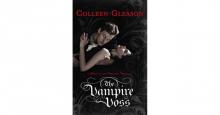 The Vampire Voss
The Vampire Voss Lavender Vows
Lavender Vows Sanctuary of Roses
Sanctuary of Roses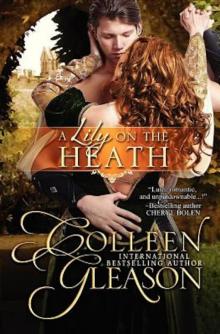 A Lily on the Heath
A Lily on the Heath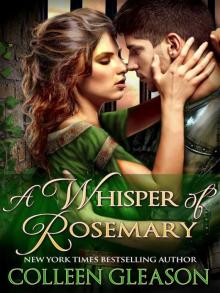 A Whisper Of Rosemary
A Whisper Of Rosemary The Rest Falls Away
The Rest Falls Away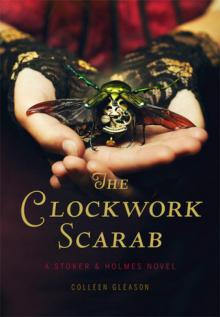 The Clockwork Scarab
The Clockwork Scarab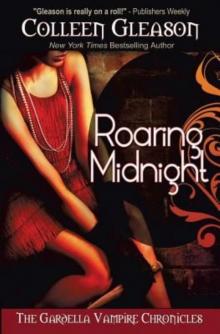 Roaring Midnight
Roaring Midnight The Vampire Dimitri
The Vampire Dimitri Countdown To A Kiss A New Years Eve Anthology
Countdown To A Kiss A New Years Eve Anthology The Vampire Narcise
The Vampire Narcise When Twilight Burns
When Twilight Burns The Bleeding Dusk
The Bleeding Dusk As Shadows Fade
As Shadows Fade Sinister Stage: A Ghost Story Romance and Mystery (Wicks Hollow Book 5)
Sinister Stage: A Ghost Story Romance and Mystery (Wicks Hollow Book 5)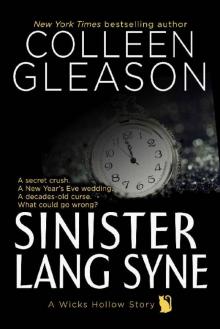 Sinister Lang Syne: A Short Holiday Novel (Wicks Hollow)
Sinister Lang Syne: A Short Holiday Novel (Wicks Hollow) Sinister Sanctuary
Sinister Sanctuary Night Beckons
Night Beckons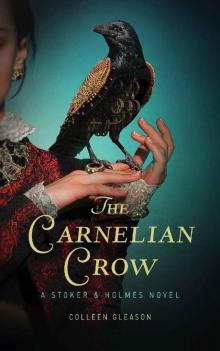 The Carnelian Crow: A Stoker & Holmes Book (Stoker and Holmes 4)
The Carnelian Crow: A Stoker & Holmes Book (Stoker and Holmes 4) The Shop of Shades and Secrets (Modern Gothic Romance 1)
The Shop of Shades and Secrets (Modern Gothic Romance 1) Lavender Vows tmhg-1
Lavender Vows tmhg-1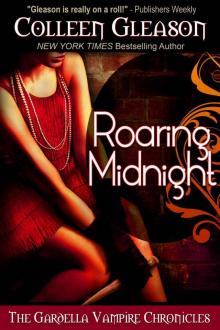 Roaring Midnight (The Gardella Vampire Chronicles | Macey #1)
Roaring Midnight (The Gardella Vampire Chronicles | Macey #1) Lavender Vows (The Medieval Herb Garden Series)
Lavender Vows (The Medieval Herb Garden Series) Dark Secrets: A Paranormal Romance Anthology
Dark Secrets: A Paranormal Romance Anthology Roaring Shadows
Roaring Shadows The Gems of Vice and Greed (Contemporary Gothic Romance Book 3)
The Gems of Vice and Greed (Contemporary Gothic Romance Book 3)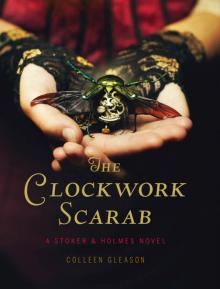 The Clockwork Scarab s&h-1
The Clockwork Scarab s&h-1 The Chess Queen Enigma
The Chess Queen Enigma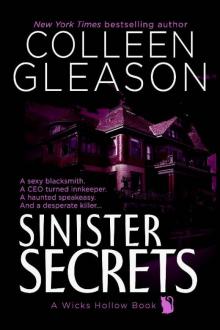 Sinister Secrets
Sinister Secrets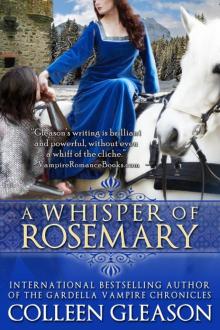 A Whisper of Rosemary (The Medieval Herb Garden Series)
A Whisper of Rosemary (The Medieval Herb Garden Series) Dark and Damaged: Eight Tortured Heroes of Paranormal Romance: Paranormal Romance Boxed Set
Dark and Damaged: Eight Tortured Heroes of Paranormal Romance: Paranormal Romance Boxed Set Roaring Shadows: Macey Book 2 (The Gardella Vampire Hunters 8)
Roaring Shadows: Macey Book 2 (The Gardella Vampire Hunters 8)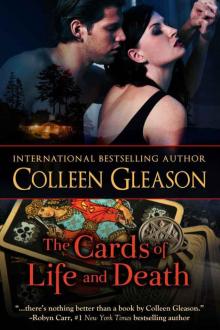 The Cards of Life and Death (Modern Gothic Romance 2)
The Cards of Life and Death (Modern Gothic Romance 2) Roaring Dawn: Macey Book 3 (The Gardella Vampire Hunters 10)
Roaring Dawn: Macey Book 3 (The Gardella Vampire Hunters 10) Sinister Summer
Sinister Summer Sinister Sanctuary: A Ghost Story Romance & Mystery (Wicks Hollow Book 4)
Sinister Sanctuary: A Ghost Story Romance & Mystery (Wicks Hollow Book 4)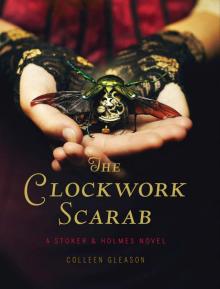 The Clockwork Scarab: A Stoker & Holmes Novel
The Clockwork Scarab: A Stoker & Holmes Novel Max Stops the Presses
Max Stops the Presses The Spiritglass Charade
The Spiritglass Charade Max Stops the Presses: A Gardella Vampire Chronicles Short Story
Max Stops the Presses: A Gardella Vampire Chronicles Short Story Tempted by the Night
Tempted by the Night